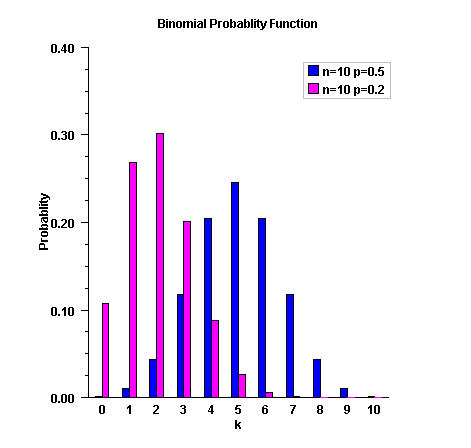Assembly: ImslCS (in ImslCS.dll) Version: 6.5.0.0
 Syntax
Syntax
| C# |
|---|
public static double Binomial( int k, int n, double pin ) |
| Visual Basic (Declaration) |
|---|
Public Shared Function Binomial ( _ k As Integer, _ n As Integer, _ pin As Double _ ) As Double |
| Visual C++ |
|---|
public: static double Binomial( int k, int n, double pin ) |
Parameters
- k
- Type: System..::.Int32
The int argument for which the binomial distribution function is to be evaluated.
- n
- Type: System..::.Int32
The int number of Bernoulli trials.
- pin
- Type: System..::.Double
A double scalar value representing the probability of success on each independent trial.
Return Value
A double scalar value representing the probability that a binomial random variable takes a value equal to k. Remarks
Remarks
Method Pdf.Binomial evaluates the probability that a binomial random variable with parameters n and p with p=pin takes on the value k. It does this by computing probabilities of the random variable taking on the values in its range less than (or the values greater than) k. These probabilities are computed by the recursive relationship
To avoid the possibility of underflow, the probabilities are computed
forward from 0, if k is not
greater than ![]() , and are computed backward
from n, otherwise. The smallest positive machine
number,
, and are computed backward
from n, otherwise. The smallest positive machine
number, ![]() , is used as the starting value
for computing the probabilities, which are rescaled by
, is used as the starting value
for computing the probabilities, which are rescaled by
![]() if forward computation is
performed and by
if forward computation is
performed and by ![]() if backward
computation is done.
if backward
computation is done.
For the special case of p = 0, Pdf.Binomial is set to 0 if k is greater than 0 and to 1 otherwise; and for the case p = 1, Pdf.Binomial is set to 0 if k is less than n and to 1 otherwise.
